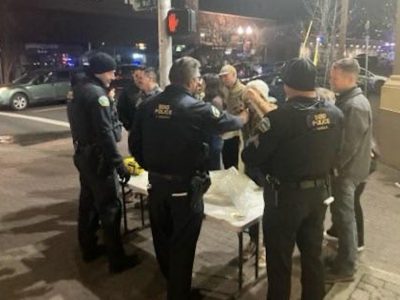
Three sheriff’s deputies rush in and wrestle a handcuffed man to the ground, face down.
All three hold the man: one kneeling on his back, another appearing to kneel on his neck. They attempt to re-cuff the man, hands behind his back. The prisoner eventually loses consciousness. After a few minutes, the deputies leave him, unmoving, on the floor of the jail cell.
The handcuffed man regains consciousness and knocks on the jail cell door. The deputies return as he kneels, offering no resistance. They roll the handcuffed man onto his side and chain him, hands behind his back, to a urine grate in the floor.
He’s left there for two and half hours.
The man is Juan “Tony” Sancho. He was an actor performing with the Oregon Shakespeare Company when this incident happened at the Jackson County Jail in Medford, Oregon, in April. Last month, he filed a civil lawsuit against Jackson County, alleging excessive force.
Jackson County Sheriff Nathan Sickler told the Medford Mail Tribune that “Holding someone down temporarily to control them, across their back and shoulders, is much different than kneeling on someone’s neck and restricting their breathing.” OPB reached out to the Jackson County’s DA’s office for further comment, but has received no response.
One of his lawyers, Matthew Rowan, spoke to OPB’s Weekend Edition recently about the case and the questions it raises.
Rowan said the Sancho was walking home after a night out celebrating with his fellow Oregon Shakespeare Festival performers when he encountered the Ashland police.
“During the course of that conversation, Tony Sancho very clearly and lucidly explained that his house is two blocks away,” Rowan said. “He even gave the address to that house.”
In a video of the arrest Sancho appears intoxicated, repeating himself as he speaks, but he expresses fear of being a Latino man being apprehended by police in a 92% white city.
“Wait, wait, wait, please, please no I’m not going to relax,” Sancho says in the video. “I’m not going to relax because I’m a brown man, I’m a brown man in this situation.”
His agitation escalates, and the officers apprehend him. He says “Don’t do this, don’t do this, please.”
“Let’s keep in mind that Tony at no point was placed under arrest at all,” Rowan said. “In fact, at one point he was told by law enforcement that he was not in trouble.”
Sancho was initially charged with resisting arrest, but Ashland Police Chief Tighe O’Meara requested that the Jackson County District Attorney’s office drop the charge.
“I did this not because I felt the charge was unwarranted,” O’Meara said in a statement, “but rather because I thought that an important ongoing dialogue and relationship building effort would be ill-served by pursuing this prosecution.”
Ashland’s mayor and city council also condemned the actions of the Jackson county jailers.
Sancho’s night in the Jackson County Jail happened long before George Floyd was killed by police in Minneapolis, but the similarities are striking: another brown man, being violently detained by a squad of white law enforcement officers.
Rowan said the public has voiced its opposition to the type of force that both Floyd and Sancho experienced. “The needle has been moved on a societal level on what type of police force our community deems to be tolerable,” he said.
Race isn’t an allegation or a component of Sancho’s lawsuit for the time being, but Rowan said that doesn’t discount what Sancho felt as he was being detained.
“What my client was feeling as a racial minority while he was being questioned by law enforcement, his own feelings,” Rowan said, “I would imagine that informed the fear and trauma that he experienced.”
And Rowan sees clear parallels between the excessive force Sancho accuses Jackson County deputies of using against him and the reports of police brutality that sparked this year’s protest movement across the country. Jackson County Sheriff Nathan Sickler publicly condemned the policing that led to George Floyd’s death; his deputies used similar techniques against Sancho.
“Some of the statements that he said are directly quoted in our lawsuit,” Rowan said. “You never leave somebody on their stomach, it increases the risk of positional asphyxia; you don’t want to put your full body weight on individuals: you can clearly see that happening in our case as well.”
Sancho sustained bruises on the wrist, knee and elbow. The actor is currently living in California.
Rowan said the encounter with police was a life-altering experience.
“He’s still dealing with the trauma of what occurred to him, and he’s not prepared to speak about it,” Rowan said.
Sancho’s case is a civil one; Rowan is not advocating for criminal charges against the deputies who detained his client, and he said he doesn’t know if the Jackson County district attorney is pursuing charges either.
But as the nation continues to grapple with excessive force in America, Rowan said the case is asking the same question protesters are asking in the streets every day: What constitutes excessive force by police — and what should the consequences be when officers do go too far?
“Is there a level of force that is excessive — which you can see, for example, in the video involving my client — will those types of cases be prosecuted?” Rowan asks. “That remains to be seen.”












